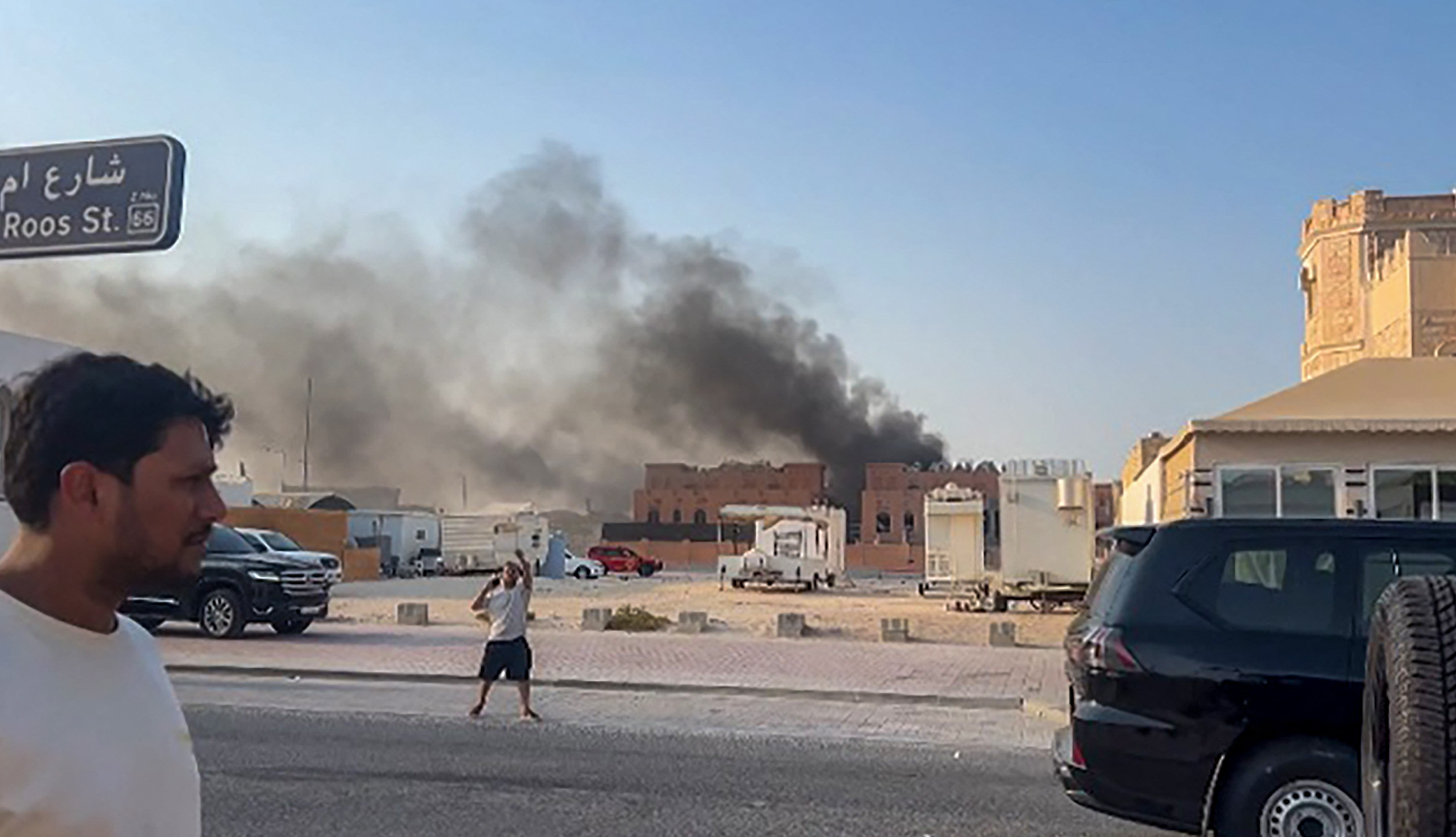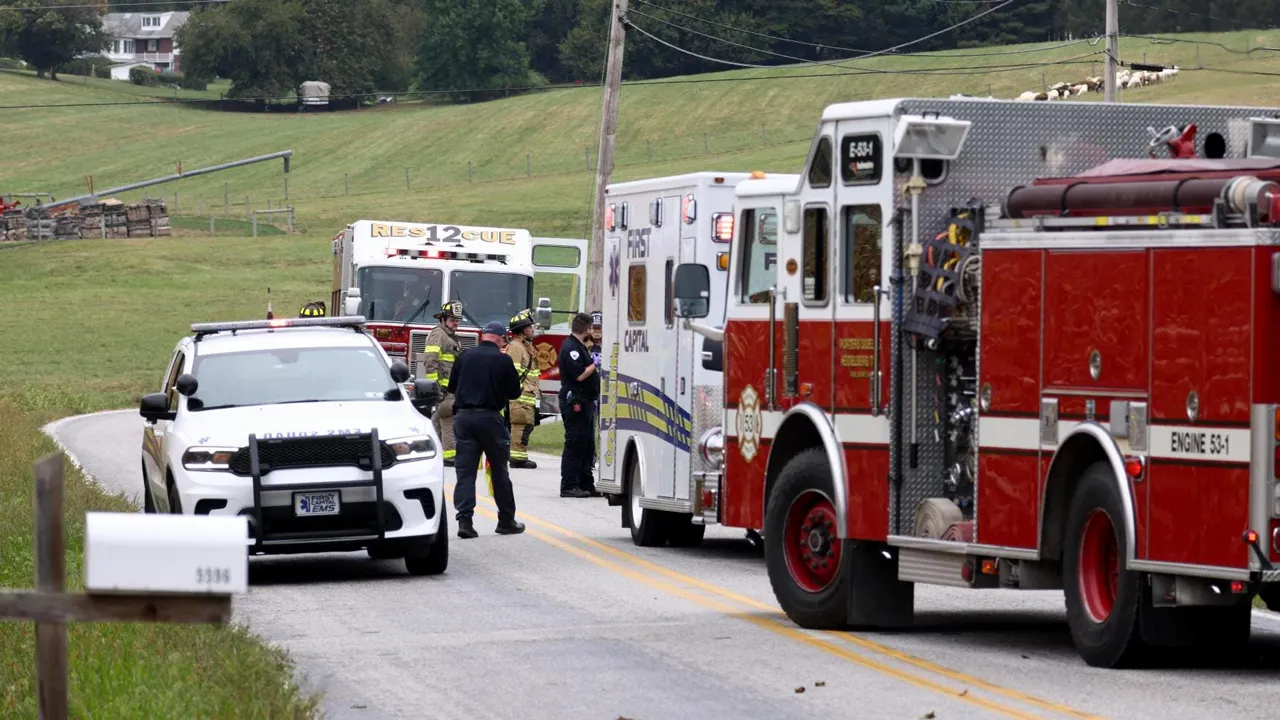
A senior Qatari official has told Newsweek that the nation and its fellow Gulf Cooperation Council (GCC) partners were planning to convey to President Donald Trump a drastic change in regional views toward Israel fallout as a result of its recent strike in Doha.
Speaking on the eve of the high-level week of the United Nations General Assembly that will bring leaders and top officials from across the world to New York City, Qatari Foreign Ministry spokesperson Majed al-Ansari described the Israeli strike that targeted a Hamas office in the Qatari capital, killing six people, including 22-year-old Qatari Internal Security Force Lance Corporal Badr Saad Mohammed al-Humaidi al-Dosari, as “a moment that changed Qatari society forever.”
“For the first time in our history, one of our own was killed by an airstrike on our country,” al-Ansari, who also serves as adviser to Prime Minister Sheikh Mohammed bin Abdulrahman Al Thani, said, “an airstrike that wasn’t warranted, had nothing to do with Qatari participation in any kind of violent conflict, anywhere, and was a direct result of Qatar choosing to be an actor for peace.”
The effects of the September 9 strike, which al-Ansari said took place as Hamas officials met to discuss a new ceasefire proposal to the ongoing war in Gaza that Qatar has played a key role in mediating, have reverberated far beyond the peninsular nation of around 2.6 million people bordering Saudi Arabia and the Persian Gulf.
“This has changed the region forever,” al-Ansari said. “Our region post the ninth of September is not the same region as it was before.”
At a time when Israel was looking to expand its Abraham Accord agreements, al-Ansari said that the unprecedented attack “didn’t just change Qatari society, it changed GCC perception of the threat” posed by Israel for the first time in the history of the six-member bloc that also includes Bahrain, Kuwait, Oman, Saudi Arabia and the United Arab Emirates.
“We have total confidence in our neighbors and our relationship with them, and we know that they will take steps as they see fit,” al-Ansari said, “but in accordance with, as I said, the new threat perception in the region, we are here now, collectively in New York.”
“There are meetings that will be held between the GCC and President Trump, and one of the main messages that will be conveyed is that new threat perception in the region, and how our relationship with the U.S. needs to address this new threat perception,” he added. “And we have total confidence not only in our shared belief of security in the region, but in the partnership with the United States for it.”
Calls for ‘Assurances’
Shortly after the strike in Doha, Israeli Prime Minister Benjamin Netanyahu’s office took full credit for the operation, which Hamas has said led to the death of five of its members but failed to kill any leaders.
“Today’s action against the top terrorist chieftains of Hamas was a wholly independent Israeli operation,” Netanyahu’s office said in a statement at the time. “Israel initiated it, Israel conducted it, and Israel takes full responsibility.”
Netanyahu reiterated this position last week during a meeting with Secretary of State Marco Rubio for an event the U.S. Embassy to Israel.
“It was a decision taken by me and our top security forces and chiefs,” Netanyahu said. “It was conducted by us, and we assumed full responsibility for it because we believe that terrorists should not be given a haven—the people who planned the worst massacre of the Jewish people since the Holocaust cannot have a haven. So, we did it on our own, period.”
Israeli officials report that around 1,200 people were killed when Hamas led a surprise attack against Israel on October 7, 2023, sparking a war in which the Gaza-based Palestinian Health Ministry has recorded around 62,000 deaths in the Hamas-led territory.
The war has also spread to numerous other fronts, killing thousands more in Lebanon, Iraq, Iran, Syria, the West Bank and Yemen, with the strike on Qatar marking yet another deadly spillover over a conflict that has ravaged the region and tested Trump’s vow to oversee peace in the Middle East.
The White House has stated that it was informed of the impending attack in Doha by the U.S. military and Qatar has said it only received communication of the strike from Trump’s special envoy, Steve Witkoff, as missiles hit the capital. Trump has also denied having foreknowledge of the operation and has since asserted “that such a thing will not happen again on their soil.”
But with Netanyahu refusing to rule out further strikes on Qatar, al-Ansari said that, even while Doha still strongly believes in “the strength of the relationship” with Washington, “we feel the need for a renewed sense of assurance.”
Until then, al-Ansari said, there could be little movement on other related fronts, including Qatar’s role in negotiations.
“First of all, our main concern right now is on addressing the attack, maintaining our sovereignty and security of our people, and making sure that there is accountability for this attack,” al-Ansari said. “Any other political consideration has to take a back seat. We are not going to move on other issues until we receive assurances that our country is safe, our peoples are safe.”
“We will not be dragged into regional escalation by Israel, nor are we going to be complicit in such regional escalation, and therefore we will take very clear measures to make sure that the assurances are there, to make sure that there is accountability,” he added. “And after we are done with that issue, other considerations can be put on the table.”
The Fate of Gaza Talks
The strike has raised questions over the future of the Israel-Hamas negotiations, which have been deadlocked since the collapse in March of a temporary ceasefire deal won with U.S. backing just days before Trump entered office for a second term in January.
U.S. and Israeli officials have blamed Hamas for failing to accept successive proposals outlining a new temporary cessation of hostilities and the release of 48 hostages held in Gaza, while the group has called for its own set of assurances that Israel would not resume the conflict immediately after the deal would expire.
Al-Ansari argued that the experience of the attack in Doha has undermined confidence in Israel’s position.
“When one party decides to approve a proposal, send it to the other party, wait for them to meet, and then bomb the country that is hosting the talks and bomb the negotiators they are sending the proposal to, what kind of validity does talks have post that point?” al-Ansari said.
“How are you going to sound rational by asking the other party to meet again to discuss any kind of proposal if it was shown that the other party on the other side of the table is basically waiting for you to meet in order to bomb you, unless there are assurances that this is not the case, that there is a partner for peace on the other side, that hostages and the people of Gaza matter more to policymakers than their own political agendas and court dates,” he added. “What validity do the talks have?”
At the same time, al-Ansari said there is no alternative to a diplomatic solution, as he believed Israel could not win the war by military means alone.
“What is a one-sided victory when you are talking about 5.5 million Palestinians living in historical Palestine? Is Prime Minister Netanyahu aiming to vacate the Palestinians out of all of Palestine? Is he aiming to kill off the 2.3 million people in Gaza? Is he aiming to bomb every city in the region until no city has any Palestinians of any kind? This is an unachievable victory,” al-Ansari said.
Between Iran and Israel
Prior to the eruption of the war in Gaza in October 2023, much of the GCC’s security focus had been directed toward Iran. Doha’s relationship with the Islamic Republic was one of several factors that fueled a 2017 boycott led by Saudi Arabia, the UAE, Bahrain and Egypt against Qatar, resolved four years later with help from the first Trump administration in early 2021.
GCC-Iran tensions rose throughout these years as Iran was blamed for backing its Yemeni ally, Ansar Allah, also known as the Houthi movement, in conducting attacks against Saudi Arabia and the UAE, as well as in a direct strike against Saudi oil facilities in 2019. Iran has consistently denied attacking GCC states directly or in aiding Ansar Allah operations to do so.
The UAE and Bahrain’s decision to join the Abraham Accords in 2020 also riled Iran, though relations have since begun to stabilize, with Riyadh resuming diplomatic ties with Tehran after a seven-year hiatus in March 2023. The regional conflict that would break out later that same year has complicated the GCC’s Iran-Israel balancing act, however, with Qatar finding itself on the front lines even before the Israeli strike earlier this month.
In June, as Israel pursued a widespread and sustained series of strikes across Iran, which responded with missile and drone attacks, the U.S. intervened by striking three Iranian nuclear facilities. Hours before Trump would declare a ceasefire to what he referred to as the “12-Day War,” Tehran replied to the U.S. bombing by launching missiles at the country’s largest military facility in the Middle East, Al Udeid Air Base, located in Qatar.
The GCC condemned both the U.S. strikes on Iran and Iran’s retaliation against the U.S. base in Qatar. Al-Ansari, for his part, called the entire escalation “very problematic,” while contrasting the two strikes conducted by foreign powers against his country over the past three months.
“Let me put it very bluntly, the only attack on the GCC that cost lives was the Israeli attack,” al-Ansari said. “That does not mean that we take lightly any attack on our sovereignty. We have made it very clear in our response to the Iranian attack that we will not take this lying down and we do not consider this to be an incident that goes without accountability.”
But whereas, he said the “Iranians have formally apologized” and offered assurances that there will not be a repeat, Israeli officials “are gloating” about their operation and leaving open the possibility of future operations. Also concerning, he said, is Israel’s military superiority that it has wielded on multiple fronts simultaneously throughout nearly three years of constant conflict.
“The problematic nature of it is the qualitative advantage that Israel has in the region,” al-Ansari said. “It is probably the only country which nobody in the region has the ability to withstand an attack from as a result of that qualitative advantage that they have, and therefore, for us, when it comes to threat perception, that means a lot.”
He pointed to examples of how Israel’s targeting of not just Qatar but other Arab states has fueled this turning point in the GCC’s view of a country once thought of as a potential partner for peace.
“We are not looking only to one side as a threat. Now we are looking westward,” al-Ansari said. “What does it mean when Israel becomes an active security threat to the GCC region? It has already proved itself a threat to its neighbors, to around seven countries around the region, by attacking flotillas at sea, by attacking South Lebanon and basically annexing part of South Lebanon and part of Syria, by bombing Yemen.”
“They have proven that they have no respect for the sovereignty of their neighbors,” he added. “So, if that is the case, what does that mean for any prospects for peace in the region as a whole?”
But rather than eschew further diplomacy, Qatar is looking to channel the regional sense of insecurity to pave the way for a renewed peace process with the help of the U.S. and other stakeholders, he said.
“I think the only way out of this is to work with the international community, with the help of the United States and others, to assure all the peoples in the region that the U.S. and the international community are invested in the safety of all the peoples in the region, regardless of where they hail from,” al-Ansari said, “and that Prime Minister Netanyahu, finally, is pushed to coming back to the table, acting like a statesman and dealing with the region like he is a neighbor, not an invader.”
As for Tehran, he said there remains “a lot of issues where Iran is not conducive to peace in the region.” But he expressed confidence that here, too, diplomacy backed by a unified GCC stance was the best path forward.
“The relationship with Iran is also mandated with the fact that they are our next-door neighbor,” al-Ansari said. “We share the gas fields with them, we share the Gulf waters with them, we share history with them, and we know that we need to find a way for the sake of our children, our children’s children and the Iranian people to be able to live together in our region.”
The Global Mediator
While uncertainty surrounds the fate of the peace talks over the war in Gaza, Qatar continues to throw its outsized diplomatic clout behind other mediation efforts occurring across the globe.
This work was demonstrated on Friday when Afghanistan’s Taliban-led government released a British couple held for months following negotiations mediated by Qatar. Doha, having played a key role in hosting U.S.-Taliban talks that put an end to the longest war in U.S. history, has continued to serve as a conduit between the still-unrecognized Taliban administration and the international community.
Qatar has also proven to be among the few nations capable of supporting direct deals between Russia and Ukraine amid Europe’s deadliest conflict since World War II. Last month marked the latest agreement secured with Qatar’s aid to return dozens of Ukrainian children from Russia and Russia-occupied territories.
Doha was also at the heart of another milestone achieved last week, hosting the first round of peace talks between the Colombian government and the powerful Clan de Golfo, also known as the Gaitanist Self-Defense Forces of Colombia, right-wing paramilitary group and drug cartel.
Such efforts are necessary, al-Ansari stated, at a time when peace agreements are exceedingly rare and “conflicts have been just piling on top of each other in a way that is dangerous for all of us.”
“So, Qatar has been trying to be the unique player when it comes to that point, and just talk to everybody about everything,” al-Ansari said, “the ability to talk to Russia and Ukraine, to the interim government in Afghanistan and the United States, to the Venezuelan government and the United States, to the Colombians and the Gaitanista Colombian Army, to the DRC and to Rwanda and the M-23 [rebel movement] over there.”
“In all of these contests,” he added, “we have shown that we are trustworthy player that can work with any party, that can sit at the table and be tactically neutral in not putting anything that has to do with our agenda on the table.”
This extends, too, to the conflict in Gaza, where he said Qatar had been “able to represent Israel and Hamas in the talks in the same way,” and more broadly, “to talk on behalf of those affected by any conflict and not take into consideration our national interest, but take into consideration the possibility that peace can be the result of what we do.”
He fully expected these efforts to continue in the wake of the Israeli strike that has otherwise shaken Qatar and the region to its core.
“It will take much more than the bullying actions of Prime Minister Netanyahu to drive us away from peace,” al-Ansari said. “It will take more than the thuggish behavior of him and his goons to make Qatar passive in the international community.
“He can scapegoat his failure through Qatar as much as he likes, but we are committed to this,” al-Ansari added. “It’s part of our DNA; it’s part of our fabric.”



